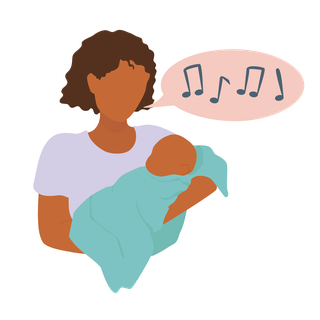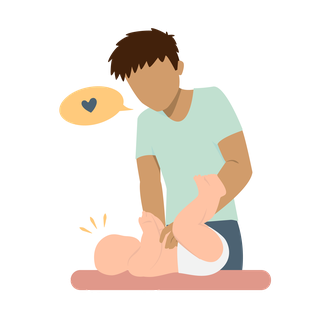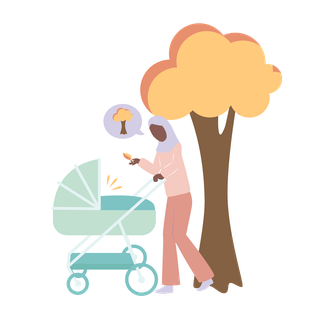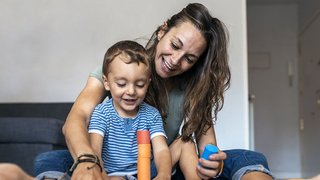First sounds: 0 to 6 months
It's the little moments together that matter the most when you're encouraging your baby towards their first sound, hum, giggle or word.
Every game or nursery rhyme will help them get to know you and your voice. It might not seem it, but this is an important step in their journey to talking.
Video: Singing songs with your baby
Watch a mum singing to her baby. The mum makes sure she is face to face and close when singing. Early exposure to singing helps your baby learn sounds.
Activities for your daily routine

Feeding time
Your baby loves hearing your voice and watching your face, so try talking and singing to them while feeding.
Using exaggerated, sing-song ups and downs really helps them to follow the movements of your mouth and supports their early speech development.
Enjoy singing together
Babies love to hear the same songs and rhymes over and over again. They need lots of repetition to learn words.
Don't worry about repeating the same rhymes, you'll be helping your baby to learn!

Nappy changing
Changing your baby's nappy is a special time to bond with them. It also lets you spend valuable face-to-face time together.
Talk to them about what you’re doing. You can say things like "let's change your nappy" or describe what you’re doing, like "socks off" or "legs up".
Using the same words and actions helps your baby learn through repetition.
You can also make it more fun by singing rhymes like "Round and round the garden".
Get close to your baby’s face
Face-to-face time helps your baby see your face as you talk. This can help them understand how you make sounds so they can start making them too!

Out and about
There are lots of exciting new sights and sounds for your baby to explore when you're out and about.
Watch their face to see what interests them. Your baby won't focus for long and their attention shifts quickly, but if something catches their eye, point to it and tell them what it is.
Be inspired by what's around you
As you look at things together, you can talk about the cars, trees or dogs that you can see.
Your baby will make sounds and faces to show you when they're interested in something.
You can reply with words and movements to show you've noticed. This is the start of having conversations together.
Tiny Happy People
The BBC’s Tiny Happy People website offers simple, expert-backed ideas and activities to support your child’s language and communication skills from pregnancy through their early years.
The tips are easy to add to your daily routine, quick, inspiring, and proven to help your child thrive.

Video: Talk with your baby as much as you can
Watch a mum talking to her baby while she's completing chores and tasks. She takes her baby with her and explains what she's doing.
Little tips for everyday play
Libraries are a free way to access age appropriate books. Some also run story time sessions for parents and their children. Find your local library service on gov.uk.
Your local council may offer activities too. Find learning activities for your child on gov.uk.
Family Hubs
Family Hubs offer support to children, young people and their families. They provide a single place to go for support and information from a variety of organisations, making it easier to get the support you need.
They can provide guidance on issues such as feeding your baby or toddler, mental health and parenting support.
Family Hubs are currently operating in 75 local authorities across England.
Learning more than 1 language
It's important to chat with your child in the language or languages you speak at home. For tips on how to do this, check out the National Literacy Trust website.
Help and advice
Your baby's eyes and hearing will be checked while you're still in hospital, or within a few weeks after the birth.
Your midwife will support you for a week or so after your baby is born and then a health visitor will take over. Your first appointment will be around 10 to 14 days, then at 6 to 8 weeks. You can discuss your baby's development and ask any questions you might have.
Ask your health visiting team for support whenever you need it, they will be able to provide tips and advice. Remember, children learn to talk at different ages. If you are worried, speak to your health visitor or nursery key worker. Or contact your local speech and language therapy service for advice.
For more ideas on how you can help your child, visit:

Early learning and development
90% of your child's brain growth takes place before they turn 5. Discover more advice and activities for ages 0 to 5 to help you make the most of every moment.
